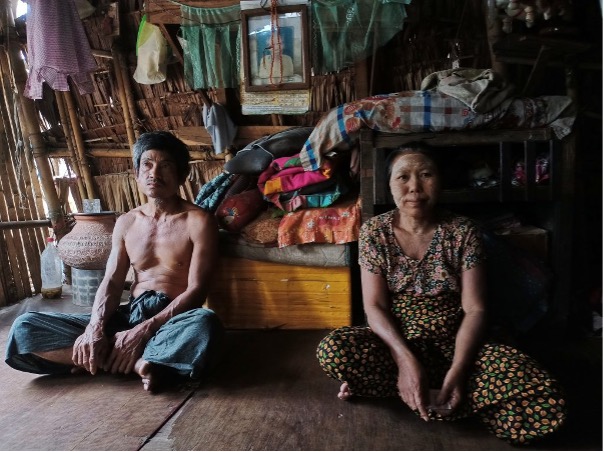Table of Contents
12th May 2021
A newly formed EAO is causing problems for the army. It has been formed in a previously peaceful ethnic area.
At least 15 junta soldiers died during two clashes with the Tamu People’s Defense Force (T-PDF) in Sagaing Region’s Tamu on the Indian border on Tuesday night and early Wednesday.
One civilian member of the T-PDF died and another was injured on Tuesday night.
A T-PDF member said five junta soldiers were killed in a clash near Pan Thar Village on Tuesday night, between 10:30 p.m. and midnight.
Another 10 soldiers were killed during an attack on a military post at 4:30 a.m. Wednesday in Kun Taung Village in Tamu district, he said.
Tamu residents formed the defense force, also known as the Tamu Security Group (TSG), and took up firearms and weapons to fight junta forces in late March, after junta troops killed an unarmed protester during a raid on a night-time protest. They killed dozens of soldiers using grenades in downtown Tamu in April. Group members went into hiding following a brutal crackdown by junta forces in mid-April.
When the civilian National Unity Government’s People’s Defense Force (PDF) was formed last week, the TSG said it would cooperate with the PDF.
In the fighting this week, the defense force used guerilla-style warfare and ambushes to resume their attacks against junta forces.
“As we said, we will continue the fight against the military dictatorship to the end. We paused the fighting recently; now we are back,” the PDF member said.
Source The Irrawaddy 12th May 2021.
The threat of massive starvation is now getting closer. In Hlaing Thar Yar one of the industrial suburbs of Yangon with a high percentage of internal immigrant workers starvation is real. They live in informal housing (lean to and tarpaulin) and are being pressured by the Junta.
Since the February 1 coup began ravaging Myanmar’s economy, Than Aye said the family has been finding it harder and harder to earn enough money to feed everyone. The jobs her children previously relied on – in wholesale markets, construction sites and garment factories – have all vanished.
“When I wake every morning, my first thought is where I’ll get money for today’s meals,” she told Frontier. “Our staples are rice, ngapi (fish paste) and vegetables, but some days we can’t afford the vegetables.”
The family moved to Hlaing Tharyar’s Yay Oak Kan ward – where more than 1,000 other families also live in an informal settlement – from Ayeyarwady Region’s Kyonpyaw Township 12 years ago so her sons could find work. But battered by a year-long pandemic and an even more devastating military coup, they are now among the hundreds of thousands of informal settlers, or “squatters”, who’ve found themselves broke, out of work and on the brink of starvation
“Before the coup, trucks from the construction sites used to come here every morning to collect workers, but I think work on the sites has halted,” Than Aye said. “Now, everything has stopped.”
Families in informal settlements like Yay Oak Kan generally cobble together their own ramshackle lean-tos and informal structures to sleep in, usually on unoccupied land in industrial townships. Most don’t pay regular rent but must sometimes pay bribes to local administrators.
Daw San San Win, 57, who also lives in the camp at Yay Oak Kan said “It’s obvious that they [the military] will not continue the affordable housing plan for squatters.”
Indeed, any hopes that those living in informal settlements may have harboured of moving into more secure housing seem to have been dashed by the coup. While there have been no formal statements about the future of these encampments, San San Win said she and her neighbours are all on edge about rumoured evictions. They have heard that new, junta-appointed ward administrators are demanding cash payments of K30,000 from some households, and demolishing structures when families can’t pay.


In one case Daw Tin Tin, a 66-year-old has had to take out high-interest loans from loan sharks that she can’t afford to repay.
“I have debts totalling more than K700,000 from four lenders. The interest rates are between 20 percent and 30pc a month, so the interest payments alone are about K200,000 a month. When I can’t pay that, it’s added to my debt, which means I’m paying interest on my interest,” she said.
She said she’s been trying to find work but has been repeatedly rejected because of her age, and loan sharks are constantly hounding and cursing at her.
U Maung Win, 55, used to work as a day labourer loading and unloading bags of rice at a wholesale market. Asked about the coup, the Yay Oak Kan resident said he doesn’t care who runs the country as long as his life gets easier. But he admitted that, so far under the junta, that has not been the case.

Hlaing Yar Thar was the scene of high casualties after the burning of Chinese owned factories earlier this year.
“Before the coup we had two crews, one working during the day and the other at night. We can’t work at night anymore because of the curfew, and the number of us trying to work on the day crew far exceeds the need,” he said.
Throughout the pandemic, hundreds of thousands of workers were laid off in Yangon, but multiple rounds of cash handouts from the National League for Democracy government and assistance from volunteer welfare groups helped ease some of the burden.
Than Aye said she received K80,000 in government relief last year – one payment of K40,000 and two of K20,000 – as well as rice, cooking oil and other basic necessities from community groups. Since the coup, she and other informal residents in Hlaing Tharyar said they received a one-off handout from the military of about two kilogrammes of rice and some cooking oil but no cash assistance, and that the junta’s ward administrators are preventing charity groups from distributing cash or in-kind donations.
“A few weeks ago, a social welfare group came to the ward to distribute some basic goods, but the ward administrator’s aides did not allow them to enter,” Than Aye said. “The ward administrator said they needed to register their names at the ward office, so they left without distributing the aid because everyone’s afraid of giving them identifying information at the moment.”
Than Aye said the situation is now more dire than at any time during the COVID-19 outbreak, with everyone in the informal camps fighting hunger pangs.
“We were not starving during the pandemic,” she told Frontier. “Now we are starving.”
Source The Frontier 12th May 2021.
Away from the demonstrations and the battles in the ethnic zones, this is the reality of life in Yangon, and will be the same in Mandalay.
Please share this article so that others can discover The BFD









